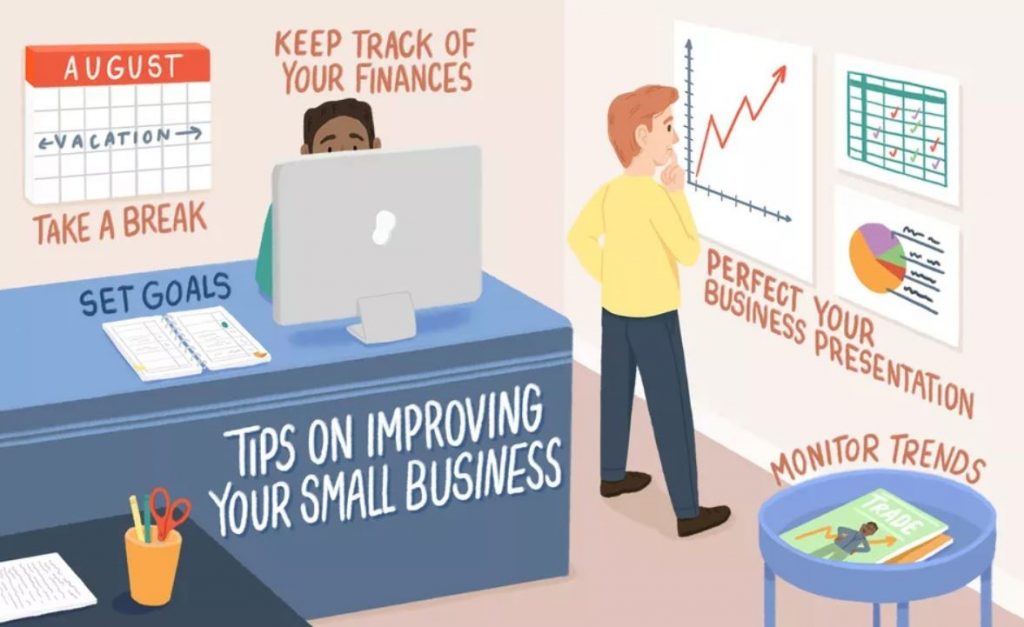Small businesses usually need funding to turn their dreams and hopes into something real. Not being able to secure funding or a small business loan may lead to:
- Stagnant growth
- Inability to pay any debts
So, it is absolutely necessary to put in place a few steps that ensure a successful future for your business.
Here are 8 tips to manage your startup or small business!
Tip #1: Proper Resource Utilization
As an investor, the foremost thing is to ensure that you use your money to the fullest. Here are the basic three E’s you need to keep in mind while running a business.
Economy
Economy means to get maximum output at minimum cost. You can achieve this by using proper ways to store, receive, and handle the raw materials.
Keep in mind that you must pay employees fairly and sufficiently to keep them motivated. This can help in avoiding the cost of re-training.
Also, as an investor, you should always stay alert and look around for better and cheaper alternatives.
Efficiency
Efficiency means maintaining productivity while doing your day-to-day activities.
You need to make sure that any activity that does not add any value to the business is eliminated. This can help in decreasing the overall business expenditure.
Effectiveness
This is the step where you evaluate the profitability of your business.
If the results are not aligned with the targets, it might be because of faulty logic and improper sales calculations. So, always set reasonable expectations and targets.
Tip #2: Tax Planning
Sometimes the government comes up with some tax exemption or even lower tax rates to encourage small businesses.
Some government agencies give subsidies to the business of a particular industry. They do so by either supplying goods at a lower cost or by investing in their business.
Tip #3: Engaging Experts
Hiring and engaging experts in your business may cost you some additional money each month. But, this can save your company from losing money where it isn’t needed.
So, always consult an expert before making any huge business decisions.
Your business can easily avoid tax and legal consequences. Try to be cautious as it saves a lot of effort and money too!
Tip #4: SWOT Analysis
SWOT stands for strength, weakness, opportunity, and threat.
- It means that you should identify your strength and should try to capitalize on it. For example, you can have an efficient team or method of doing things that can bring you more business.
- Weakness in your company that needs to be addressed. For example, a faulty delivery system may increase the number of shipments. So, always try to stay aware of your weaknesses and correct them. This is an important step.
- Opportunities and threats are items that a company cannot control, but should gameplan. For example, there’s a demand for a new product which your company may be able to produce using the company’s resources. So, always try to look out for new business opportunities. On the other hand, your business might be exposed to some threats such as a sudden change in government policies. For example, the banning of your major resources.
Tip #5: Investment Strategies for Idle Funds
Your company might find itself in a position where it has idle funds. By this, it means that you may have funds that are not invested or not being used in business.
The ideal thing you can do here is to keep funds for liquidity and to invest the rest of the funds in fixed deposits.
If your company is fine with taking some risks, it can even invest the funds in the stock market as the returns are high.
However, we suggest going for calculated risks rather than impulsive ones.
Tip #6: Dealing with a Financial Crunch
This is the most common and basic problem that a small company might face.
Sometimes, you might be in dire need of cash but you may not have sufficient funds to keep business going.
Hence, your company should always try to maintain a reserve that you can use during the time of a financial crunch.
In such a situation, you may even borrow finances from various sources. This includes loans such as working capital loans or even your family, relatives, or friends.
Another way is to ask the suppliers to increase the credit period. This can help in delaying payments.
Tip #7: Avoid Overspending
Many times a small business can be weighed down by unnecessary or overspending. If you do have a loan or even if you have some sales coming in, it is best to still have that bootstrap mentality.
Tip #8: Keep Your Workforce Motivated
You should always try to be a transformational leader rather than a strict boss.
Keep in mind that a good workforce is an asset to the company. This can help you in gaining more profits and maintaining public relations.
So, always try to reduce your employees’ grievances and provide them with a healthy work environment. Check out even more on this topic on Medium.
Final Thoughts
To summarize, your company should always strive to achieve growth by staying aware of all the opportunities available to it.
Moreover, try to use your resources efficiently and don’t go for impulsive decisions. If possible, you can always consult an expert too!












